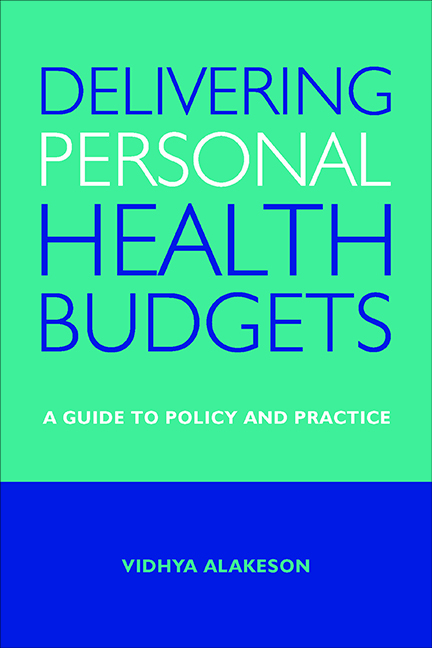Book contents
- Frontmatter
- Contents
- List of tables and figures
- Acknowledgements
- Prologue: Stephen’s story
- Introduction
- Section 1 Introducing personal health budgets
- Section 2 Implementing personal health budgets
- Section 3 Personal health budgets and organisational change in the NHS
- Conclusion
- Epilogue: Jonathan’s story
- References
- Index
- Frontmatter
- Contents
- List of tables and figures
- Acknowledgements
- Prologue: Stephen’s story
- Introduction
- Section 1 Introducing personal health budgets
- Section 2 Implementing personal health budgets
- Section 3 Personal health budgets and organisational change in the NHS
- Conclusion
- Epilogue: Jonathan’s story
- References
- Index
Summary
In 2001, the prestigious Institute of Medicine published a groundbreaking report that defined the six dimensions of healthcare quality. Alongside more predictable dimensions such as efficiency, effectiveness and safety was patient-centredness (Institute of Medicine, 2011). More than a decade on and we need little reminder of how often care in the National Health Service (NHS) fails to deliver on this dimension of quality. From the inhumane treatment of some of the most vulnerable members of our society at Winterbourne View Hospital (DH, 2012a) and the levels of neglect revealed by the inquiry into deaths at Stafford Hospital (Francis, 2013) to repeated concerns about the lack of dignity afforded older people in hospital (CQC, 2011), our record on patient-centredness is patchy at best. Addressing the International Forum on Quality and Safety in Healthcare, Dr Don Berwick, one of the foremost experts on healthcare quality improvement, described his fear of becoming a patient and the loss of dignity and control that entails:
It scares me to be made helpless before my time, to be made ignorant when I want to know, to be made to sit when I want to stand or to be alone when I need to hold my wife's hand or to eat when I do not wish to eat or to be named when I do not wish to be named or to be told when I wish to be asked or to be awoken when I wish to sleep. You can call it patient-centredness if you choose. But I suggest to you that this is the core. It is the property of care that welcomes me to assert my humanity and my individuality and my uniqueness. And if we be healers, I suggest to you that this is not the route to the point, it is the point. (Berwick, 2009a)
Berwick's comments on the centrality of patient-centredness are viewed as those of a radical. It is a strange feature of public services, including the NHS, that the notion that services are designed for and respond to their users is considered radical. The same idea would be mundane in other industries where providers survive by virtue of their ability to respond to customers. Of course, public services are not simple commodities, but there is no shortage of evidence of services run without due consideration of the needs and preferences of those who use them.
- Type
- Chapter
- Information
- Delivering Personal Health BudgetsA Guide to Policy and Practice, pp. 5 - 10Publisher: Bristol University PressPrint publication year: 2014



